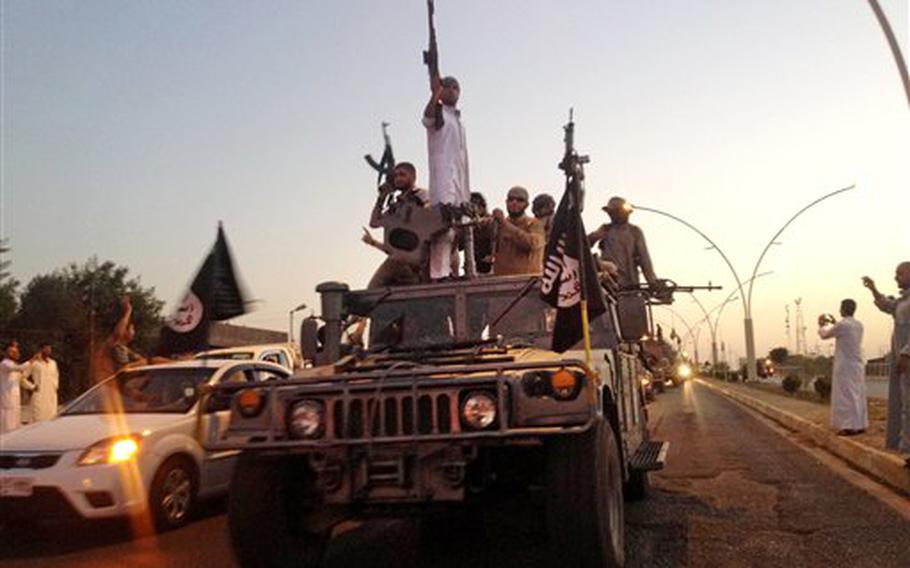
Fighters from the Islamic State group parade in a commandeered Iraqi security forces armored vehicle down a main road in the northern city of Mosul, Iraq, in June 2014. The Islamic State masked man, known as "Jihadi John," who has beheaded several hostages held by the Islamic State has been identified as Mohammed Emwazi, a Briton from a well-to-do family who grew up in West London. (AP file)
The masked Islamic State militant who appears to have beheaded several foreign hostages in Islamic State group videos has been identified by British security services as Mohammed Emwazi, a Kuwaiti-born British citizen from west London, according to the BBC.
Emwazi, 27, grew up in West London in a well-to-do family and graduated from the University of Westminster with a degree in computer programming, The New York Times reported.
He was previously known to British security services, but they had not disclosed his name earlier for operational reasons, the BBC wrote.
Known in the news media as “Jihadi John,” he is said to have gone to Syria in 2012. His name was first published Thursday on the website of The Washington Post.
He first appeared in a video in August, in which the American journalist James Foley was beheaded.
Emwazi was later thought to have been pictured in the videos of the beheadings of U.S. journalist Steven Sotloff, British aid worker David Haines, British taxi driver Alan Henning and American aid worker Peter Kassig.
In each video, the man appeared dressed in a black robe with a black balaclava covering all but his eyes and top of his nose.
Speaking with a British accent, Emwazi taunted Western powers before holding his knife to the hostages’ necks, and the video stopped. The victims’ decapitated bodies were then shown.
Earlier this month, the militant featured in a video in which the Japanese journalist Kenji Goto appeared to be beheaded.
Hostages released by IS said he was one of four British jihadists guarding Westerners abducted by the group in Syria. They were known collectively as “the Beatles.”
Emwazi apparently became radicalized after being detained by the authorities after a flight with friends to Tanzania in 2009 for a safari after graduation. He was detained and accused by British intelligence officers of trying to make his way to Somalia.
Friends of his told The Post that Emwazi and two others — a German convert to Islam named Omar and another man, Abu Talib — never made it to the safari. On landing in Dar es Salaam, Tanzania, in May 2009, they were detained by the police and held overnight before eventually being deported, they said.
Asim Qureshi, a research director at CAGE, a British advocacy organization opposed to what it calls the “war on terror,” met with Emwazi in the fall of 2009. “Mohammed was quite incensed by his treatment, that he had been very unfairly treated,” Qureshi told The Post.
Emwazi then moved to Kuwait, his birthplace, worked for a computer company and returned to London at least twice, Qureshi said. British counterterrorism officials detained Emwazi in June 2010, fingerprinting him and searching his belongings.